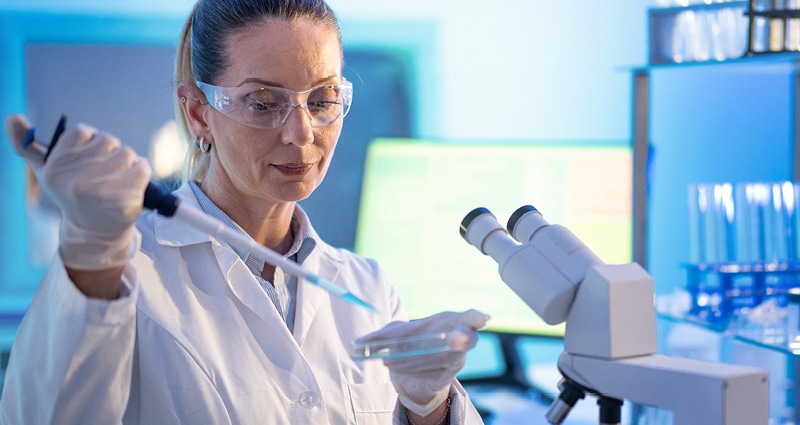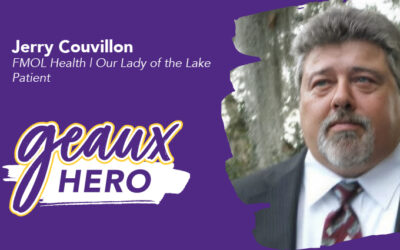Research is often thought of as something done in a lab — examining bacteria under microscopes or testing on animals. But research makes its biggest impact in a medical setting, where it improves patient lives through things as simple as surveying a patient, drawing blood or even just monitoring their eating habits.
Every medical advancement including new drug developments, medical devices or tools have required the help of volunteers and patients who took part in clinical research before it could be more widely used.
That research takes place every day at hospitals in our health system. And it’s a sign that we’re on the front lines of medical innovations, partnering with major medical and academic institutions like Johns Hopkins University, Duke University, Vanderbilt University Medical Center and LSU to develop new ways to treat a variety of health conditions.
“You won’t find a world-class medical center without a strong research program,” says Hollis “Bud” O’Neal, MD, medical director of research at Our Lady of the Lake Health.
Patients are as much partners and collaborators in research as the medical experts who lead the studies, Dr. Bud O’Neal says. Here’s four big reasons why research offers such a huge benefit to patients and the communities we serve.
The Importance of Clinical Trials
Research often takes the form of clinical trials. This is when new treatments or procedures have finally progressed to the stage where they are able to move from being tested in a laboratory setting to being administered to participating patients to help experts gain more information about the risks and effectiveness.
Hospitals like ours that are heavily involved in medical research provide patients with the opportunity to try a new treatment that isn’t yet available on the market. These options offer alternatives for patients who might not have seen positive impact or improved health with treatments they’ve tried before.
We have numerous clinical trials going on throughout our health system focused on conditions ranging from heart disease to diabetes to cancer.
Clinical trials aren’t all limited to those who are sick. Healthy volunteers can participate based on their eligibility and specific health requirements, usually to help determine how a method impacts a healthy patient versus a sick patient.
Take a deeper dive into understanding clinical trials in our health system.
Research Expands Your Care Team
Existing patients may be surprised to know participation in a clinical trial may not require more of you than your regular doctor’s visits.
Because our health system is actively involved in many research studies, certain aspects of a clinical trial — such as a blood draw or data collection — can be integrated into your regular care so you don’t have to make additional trips to take part in the clinical trial.
Those researchers are working within our hospitals, and they become part of your care team during a clinical trial. They are paying close attention to your health, checking up on you regularly and adding another layer of support so you can get the best and safest care.
Research pairs patients and medical experts together, making patients an important contributor to these medical breakthroughs and offering the hope that new treatments might improve their lives as well as improve the lives of others.
Research Improves Your Community
As a Catholic health organization, we are focused on improving the health of the communities where we serve, especially those most in need. And that extends to the research we do, as well.
Every day, our researchers are examining the most significant health needs in our communities and asking questions about the origins of those health issues and how best to address them.
We’re using things like social determinants of health to gain a better picture of not just individual needs but also tracking health trends across the community to determine what needs further study.
“The benefit of supporting this research is that you are making an investment in the future of our community,” Dr. Bud O’Neal says. “You are guaranteeing that the standard of care in our community will progress with the leading edge of medicine across the world.”
A Focus on Academic Research Leads to New Discoveries
For more than a decade, Our Lady of the Lake Health has had a collaborative partnership with LSU Health Sciences Center that allows our medical professionals and LSU’s academic leaders to work together on important health projects.
It also has brought nearly 3,000 medical students into our hospitals each year across 26 specialty programs, working alongside our doctors and specialists to care for our patients.
“We are training the next group of medical leaders who will take care of your health needs,” says Catherine O’Neal, MD, chief medical officer of Our Lady of the Lake Regional Medical Center and associate professor of clinical medicine specializing in infectious diseases at LSU Health Sciences Center.
Now with LSU as our Championship Health Partner, that collaboration has gotten stronger, allowing us to use each other’s resources for innovative new ways to treat illnesses like sepsis, for opportunities to dig deeper into research around sports medicine, and to involve more students in research in new and exciting ways.
“We’ll be able to go deeper into new discoveries,” says Dr. Catherine O’Neal. “All the way from someone inventing a new drug on campus in the chemistry lab that will make its way to the beside of one of our patients.”
While much of that research work happens at Our Lady of the Lake in conjunction with LSU, a centralized research hub like this allows us to coordinate clinical trials across our entire health system and pair our researchers with likeminded experts at other facilities.
Additionally, at places like Our Lady of the Angels Health, we are able to provide patients in rural areas with access to clinical trials through this partnership with LSU.




